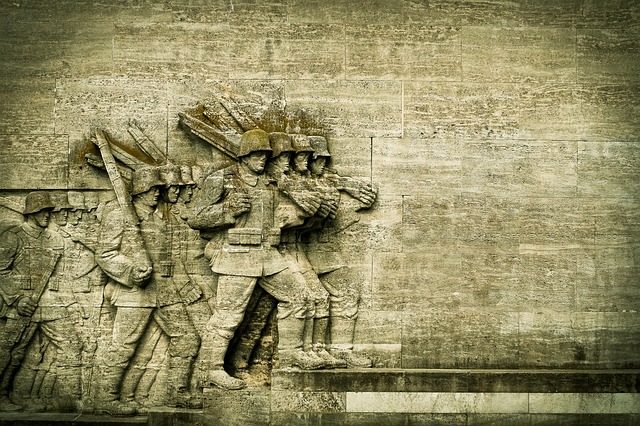Instead of bombs and the threat of nuclear war, nations can act decisively and effectively to build a world in which conflicts are resolved nonviolently–that is, a world beyond war–by participating vigorously in four categories of action:
- nonviolent conflict resolution processes, such as nonviolent diplomacy and in other processes such as the Truth and Reconciliation Commission of South Africa (learn more)
- appropriate foreign aid which builds friendships with people in impoverished nations in such aid projects as the Peace Corps, Heifer International, The Central Asia Project, and others (learn more)
- support for, adherence to, and development of international law as in signing and supporting the Antiballistic Missile Treaty and participation in the International Criminal Court (learn more)
- cooperation and collaboration with other peoples and nations as in support for and participation in the United Nations, and international efforts to eradicate polio and smallpox (learn more)
Nonviolent conflict resolution processes
The Truth and Reconciliation Commission of South Africa
A process many people know is the Truth and Reconciliation Commission in South Africa. Some Afrikaners did die after Apartheid ended and the black people took over the government in South Africa. But the bloodbath that was predicted didn’t happen, and the Truth and Reconciliation Commission is generally credited for this. The Truth and Reconciliation Commission provided a process for people to speak their truth, for people to go on trial. It was a legal process, and it was effective in keeping the country together in a turbulent time. More recently, mediators from Northern Ireland visited South Africa to learn about the Commission, then took what they learned home and have used a similar process to diffuse violence and resolve violent conflicts in Northern Ireland.
Another example of a nonviolent conflict resolution process which prevented continued violence was the work of Dr. Harold Saunders in Tajikistan.
The Inter-Tajik Dialogue (described in A Public Peace Process by Dr. Harold Saunders)
The Inter-Tajik dialogue was a process begun by Dr. Harold Saunders, former Assistant Secretary of State who accompanied Henry Kissinger on his shuttle diplomacy in the 1970s. Saunders was with President Carter, Prime Minister Begin and President Sadat at the Camp David Accords. His life’s work has included considerable international negotiation and the study of international affairs.
When the Soviet Union broke apart in 1991, a civil war broke out in Tajikistan. It was a struggle for power between factions. In what was probably the first joint Russian-American peace initiative, Saunders , two other Americans, and three Soviets went to Tajikistan in 1993. They gathered leaders of warring factions. The first meeting had to be scheduled outside of the country for safety reasons. At first the participants wouldn’t even look at one another unless they were shouting in anger. They met from 1993 to 1998, about every four months. During those five years they gradually realized the futility of their civil war. By 1998 they had written a paper about all the things they agreed on, and they cooperated to build civil society and democracy in Tajikistan. This is a fascinating and little known history.
Neve Shalom Wahat al Salaam
“Oasis of Dreams” by Grace Fenerverger, Routeledge Farmer, New York 2001, ISBN 0-4159-2938-3.
This third example of a successful, nonviolent process that builds a world beyond war is the story of the village called Neve Shalom Wahat al Salaam, 30 miles west of Jerusalem. It’s a most amazing place. For 25 years, approximately equal numbers of Israelis and Palestinians have lived together. The name Neve Shalom/Wahat al Salaam” means “oasis of peace in Hebrew and Arabic. The people in this village have already moved beyond war. They make their living by maintaining a school and by giving conflict resolution seminars. When they first started their community, they bought the land, and they began to live together. There was a lot of objection to their living in community together, both by the Palestinians and the Israelis. “How can you be traitors? How can you talk to them? How can you work with them?” both sides were asked that by their peers outside the community. But the school that they developed was so good that many of these skeptical families sent their children anyway, since it was the best education available.
During twenty five years, the villagers in Neve Shalom/Wahat al Salaam have learned a lot. Theirs has not been an easy road. One of the sons of one of the Israeli families died during his army service in a conflict with Palestinians. The family wanted to build a memorial to him in the village, and a Palestinian family said, “No. You can’t do that. You know, look at it from our point of view.” They’ve been through difficult times, but they stay beyond war in their community.
Human survival could depend on our knowing of these examples of success and nonviolence. We need to develop an insatiable curiosity for what nonviolent processes work so we can apply these processes and principles to other conflicts. As a culture, we need a shift in our thinking, so that we’re curious and supportive about what will aid us in our long term survival.
Appropriate foreign aid
The United Nations recommends that nations contribute .7% of their gross domestic product as foreign aid. The contributions The Netherlands, Denmark and Norway exceed this amount.
The United States provides .17% in foreign aid. Of the twenty-one most industrialized nations in the world, the United States ranks twenty-first in foreign aid contributions. For about 25% of the United States military budget, relationships of compassion and gratitude could be built with people in the impoverished world. Relationships of respect would make people in the United States and around the world more secure.
According to the United Nations and Physicians for Social Responsibility, using only 25 % of the United States’ current and growing military budget it would be possible to:
-
- Eliminate starvation and malnutrition worldwide: $19 billion
- Stabilize world population: $10 billion
- Assist to house the 20 million refugees, mostly fleeing wars: $5 billion
- Assist impoverished nations w/ health care & AIDS control: $21 billion
- Provide shelter & clean water worldwide: $31 billion
- Eliminate illiteracy and build democracy: $8 billion
[These figures are from the World Game Institute info@searth.com]
Money that pays for war could also greatly benefit the domestic needs of nations. In the United States, for example, poverty, hunger and crime are on the rise; there are many more people who are jobless and have no health insurance; the quality of public education is falling; and our infrastructure is crumbling. Military money could be shifted into programs at the state and national level to address these problems that so negatively affect the quality of life.
But taking care of people in the United States is not enough because we all need to live in a world where people have hope and can meet their basic needs. World security depends on that. Foreign Aid models like the Marshall Plan that rebuilt Japan and Germany after World War II and laid the foundation for beneficial trading partnerships with them for fifty years is an example of good investment in peace and economic prosperity. This model, and others such as the Peace Corps, the Heifer Project and the Central Asia Project are available for our study.
Beyond War does not advocate unilateral disarmament. Instead, we advocate for building a world beyond war. We advocate careful and clear thought about spending national resources. U.S. military spending has been about $585.5 billion per year (not including the costs of the war with Iraq.) With NATO allies the United States spends more that six times that of every conceivable enemy combined, including Russia and China (according to Catherine Thomasson, M.D., member Oregon Physician’s for Social Responsibility, “Health Effects of War: And Alternatives to the War on Terrorism”.
For much less than the cost of destroying the infrastructure of countries and killing both soldiers and citizens, long lasting, constructive relationships could be built which would move us beyond war. Non-governmental organizations (NGO’s) provide excellent examples of how appropriate foreign aid can be provided to make important progress with limited funds. For example,
Heifer International
This non-governmental agency gives a heifer calf to someone in an impoverished country. The first calf of that heifer is given to a neighbor, and when that calf grows to a cow and has a calf, that calf is given to a neighbor. The same is done with chickens, goats, llamas, hives of bees and other animals all over the world. These kinds of gifts can make a huge difference in a poor family’s well-being–and citizens of villages all over the world can regard the donors of these life enhancing animals as valued friends.
The Central Asia Institute
Greg Mortensen was a mountain climber who failed a climb in the Himalayas in Pakistan near the Afghan border. Greg arrived in a poor village frostbitten and very weak. The people took him in and nursed him back to health over several months until spring when he could walk out of the mountains. It was 25 miles to the nearest transportation. The villagers had saved his life, so he asked what he could do in return. Landslides had destroyed the village school, and they asked if he could help them rebuild it. He came back to the United States, wrote as many wealthy people and celebrities as he could think of, and Tom Brokaw sent him $250. Finally, an unknown and very generous person gave Greg $11,000 for his first school. He went back to Pakistan. Greg didn’t need to tell the villagers how to build the school – they already understood that better than he did–they just needed the building materials. The villagers hand carried bags of cement, lumber and roofing materials up the mountain. Native stone was used in the construction. The school is now also used also as a community center and a medical clinic. In the last decade, Greg’s Central Asia Institute has built many schools on the Pakistan-Afghan border. The Central Asian Institute has made a very big difference in the lives of people in that area, and they know at least one organization of Americans who want to partner with them to build a better world. Mortensen reports that when one of the schools that Central Asia Institute builds in partnership with a village is present, 95% of the villagers send their children to that school instead of the madrases which teach hatred of people in the west.
Beyond expressing compassion, appropriate foreign aid can help construct a world beyond war. The United States Peace Corps volunteers, citizens who work in NGO’s that provide medical care and food, and appropriate foreign aid can build the human relationships, gratitude, and cooperation necessary for the functioning of international law.
International law
In Bob Woodward’s book Bush at War, readers learn that the only response considered by the Bush Administration after September 11, 2001 was military–the use of force and bombs. The United States focused on the name “terrorists” meaning “people creating extreme fear” and operated out of our fear, responding with fight reflexes. Respected international mediator John Paul Lederach(“The challenge of terror: a traveling essay”) has said that bombing Afghanistan to vanquish the al Quaeda Network was like hitting a mature dandelion with a baseball bat–it only ensured another generation of al Quaeda.
A better choice would have been to treat as criminals the men who piloted the planes into the Trade Towers in New York and into the Pentagon. It would have been a more rational response. When Timothy McVeigh destroyed the Federal Building in Oklahoma City, the F.B.I. didn’t go to his hometown and bomb it. Probably no one thought they would–this is true because most people understand the legal system in the United States sufficiently to know that the bomber would be found and tried in court. International law needs to function in a similar way so that it encompasses criminal acts like those committed on September 11th. People need to expand the understanding that they already have about how compliance to law makes everyone safer to include relationships with people in and from other countries. We need to promote the perspective that we all live together on the planet.
Citizens from all nations need to support, develop, and adhere to international law. In a March 2003 Christian Science Monitor Opinion Editorial, Desmond Tutu writes that the most compelling international need today is the uniform application of international law. In 1998, one hundred and twenty countries signed on to the International Criminal Court. The United States has refused to sign and has undermined the court by signing twenty treaties with other countries who have agreed not to take United States citizens to court there.
The United States, a leader in the world today, has a recent pattern of refusing to sign, and backing out of having signed important international treaties that would increase the safety of everyone on the planet. For example,
- The 1972 Antiballistic Missile Treaty. In December 2001, the United States officially withdrew from the Treaty, gutting the landmark agreement. This was the first time in the nuclear era that the U.S. renounced a major arms control accord.
- Biological and Toxin Weapons Convention. Ratified in 1972 by 144 nations including the United States. In July 2001 the U.S. walked out of a London conference to discuss a 1994 protocol designed to strengthen the Convention by providing for on-site inspections.
- Treaty banning Land Mines. Signed in Ottawa in December 1997 by 122 nations. The United States refused to sign, along with Russia, China, India, Pakistan, Iran, Iraq, Veneta, Egypt, and Turkey.
- Comprehensive Test Ban Treaty. Signed by 164 nations, ratified by 89 including France, Great Britain, and Russia; signed by President Clinton in 1996, but rejected by the Senate in 1999.
- Kyoto Protocol of 1997, for controlling global warming, declared “dead” by President Bush in March, 2001.
- U.N. Convention on the Rights of the Child. Signed but not ratified by the U.S. in 1989. The only other country not to ratify is Somalia, which has no functioning government.
Cooperation and collaboration among countries
Before the bombing started in Afghanistan on October 7, 2001, there was wide spread hope in the United States and around the world that the U.S. would consider a different response than one of retaliation and revenge. Many people hoped that the world’s only Superpower would work with the United Nations and with alliances around the world to bring the criminals responsible for the terrible events on September 11th to justice. That didn’t happen. The war model was used instead. A great opportunity was missed to lead the world in a new way of how to respond nonviolently and effectively to an attack.
However, important, historically significant opportunities to collaborate and build a world beyond war remain. Nelson Mandela said: “We are all members of the international community, the global family. Leaders in the Islamic world have condemned terrorist acts. Those leaders are as important a bulwark against terrorism as any other bloc of countries.” Mandela recommends collaborating with and thereby strengthening the Islamic leaders who want to lead toward civilized conflict resolution.
There are many people around the world who regard the U.S. as arrogant, uncaring and selfish. With the threat of nuclear and other weapons of mass destruction in existence and available, this is not how any people want to be perceived. For the long term national security and prosperity of the world, we must all learn–and teach– how to work collaboratively with other peoples and nations on projects and peace keeping, and on conflict resolution processes, appropriate foreign aid, and by participating in treaties and accepting equality under international law.
One example of this is the eradication of polio. Individuals, organizations and nations have worked together to vanquish forever this terrible disease to the benefit of all mankind.
Many collaborations now exist that seek to protect the environment. An insatiable curiosity to find out about, support and build upon these collaborations is important for the long term survival of the human species.











